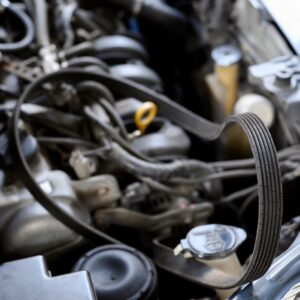Harness wires are the cables that connect all the electrical and electronic components in your vehicle. They transmit signals and power throughout car systems to fulfill different electrical functions, such as steering, braking, ventilation, and infotainment.
Types of Wiring Harnesses in a Car
Here are the different types of harness wires in a car and their functions:
Air Conditioning Harness
The air conditioning (A/C) harness connects the parts and systems that control your cabin’s temperature. That includes the A/C, heater, and related electronics.
Engine Compartment Harness

The engine compartment harness connects the battery to the alternator, spark plugs, ignition coils, and other crucial components. It also sends signals to the main computer to monitor and control the car’s performance.
Floor Harness
The floor harness connects the wires under your vehicle to their intended part or system to ensure the vehicle’s optimal performance.
Interior Harness
The interior harness lets you control different parts in your vehicle without them interfering with one another, preventing issues when using them simultaneously. It also helps power the lights, power windows, locks, and other interior components by connecting them to the electrical system.
Main Harness
The main harness provides power to most of the components on the dashboard, such as the headlights, tail lights, and turn signals. It also centralizes sub-harnesses to be connected to, providing additional power if necessary.
Common Causes of Failing Harness Wires
Wiring harnesses could fail, preventing parts from getting power or connecting to the components they need to operate, due to the following problems:
Battery Terminal Corrosion
Corrosion on the battery terminal could mean it’s under or overcharging. This results in an acid layer forming on the battery near the cables, making it hard to conduct electricity. The acid can damage the wires and block electricity.
Thermal Expansion
Thermal expansion is when the wires shorten and tighten due to cold temperatures. It causes the wires to disconnect from the connector, which disrupts the component it’s attached to.

Wear and Tear
Older vehicles often have faulty harness wires due to wear and tear, which can cause the harness to stiffen and become more prone to damage.
Chafing
Chafing is when the wires rub together or against other components. It results in damaged wire harness, and could even lead to electrical faults or fire hazards.
Chafing is when the wires rub together or against other components. It results in damaged wire harness, and could even lead to electrical faults or fire hazards.
–Anthony Harlin, ASE Certified Master Automobile Technician
Issues Caused by Faulty Wiring Harnesses
Faulty wire harnesses may cause different issues within the engine, battery, and other electrical components. Here are some of the common problems you may encounter:
Engine Shutting Down
A corroded wiring harness can cause the engine to turn off. The damage could prevent electricity from reaching the ignition circuit, resulting in the engine getting little to no voltage to function.
Ignition Problems
Issues within the battery cables often cause ignition problems, as they connect the car battery to other electrical systems. If they’re faulty, they might not deliver enough energy to power the engine.
Malfunctioning Electrical Parts
A damaged main harness can cause various electrical car components, such as the lights and dashboard, to malfunction. It could be because they’re no longer getting enough electricity to work or receiving signals from the parts they depend on.
How Long Does a Wiring Harness Last?

Wiring harnesses can last for several years, but their service life could shorten due to reckless driving, harsh conditions, improper repair on vehicles that didn’t allow for the wiring to go back to its normal position (causes chafing), or general wear and tear.
Can You Drive a Car With a Bad Wiring Harness?
It’s ill-advised to drive a car with a bad wiring harness because it can lead to engine and electrical failure. Not only is it risky, but it could also break the bank with costly repairs.
Can Failing Wire Harnesses Be Repaired?
It’s possible to fix a failing harness but only if the damage is not extensive. The average cost of wire harness repair is between $1,000 and $1,500. The final price depends on the harness and the extent of the damage. For example, minor repairs range from $300 to $1,000.
Conclusion
The harness wires in a car centralize its electrical components. As such, you must address wiring harness issues immediately to maintain your vehicle’s performance and prevent irreversible damage.
The great news is that the common causes of faulty wire harnesses are preventable. Regular upkeep can help you determine and address potential issues immediately, so stick to your recommended maintenance schedule.
How to Get a New Wiring Harness for Your Vehicle
First order of business: stop driving your car. A faulty wiring harness can cause your engine to suddenly turn off and damage electrical systems that can be pricey to fix. For your own sake, it’s best to replace it as soon as possible. Luckily, getting a replacement wiring harness is fast and easy with CarParts.com.
CarParts.com offers a wide selection of wiring harnesses, all sourced from the most trusted manufacturers in the industry. To easily browse through our catalog, be sure to input your car’s year, make, and model in our vehicle selector and make full use of our other search filters. CarParts.com also guarantees fast shipping, thanks to our warehouses strategically located around the US. Order by 12 p.m. ET, and you can expect your new wiring harness to arrive in as fast as two business days.
Don’t wait until your wiring harness breaks before replacing it. Check out our catalog of high-quality wiring harnesses at CarParts.com today!
Any information provided on this Website is for informational purposes only and is not intended to replace consultation with a professional mechanic. The accuracy and timeliness of the information may change from the time of publication.






























